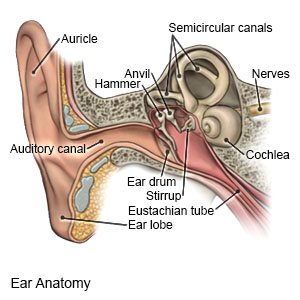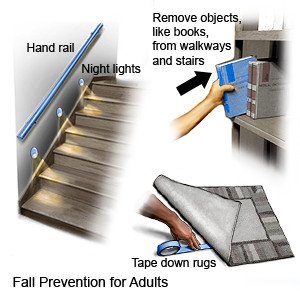Meniere Disease
Medically reviewed by Drugs.com. Last updated on Apr 2, 2024.
Meniere disease is a condition that affects the canals of the inner ear. The inner ear helps you hear and maintain your balance. Too much fluid may be produced, or there may not be enough fluid properly absorbed back into the body. This causes swelling and increased pressure in your inner ear.
 |
DISCHARGE INSTRUCTIONS:
Return to the emergency department if:
- You are vomiting and your antinausea medicine is not helping.
- You have blood, pus, or fluid coming out of your ears.
- You have dizzy spells that last longer than usual.
- Your symptoms keep coming back or get worse.
Call your doctor if:
- You have a fever.
- You have questions or concerns about your condition or care.
Self-care:
- Sit or lie down right away when you feel dizzy. Do not walk without help, drive a car, or operate heavy machinery if you feel dizzy.
- Sudden head movements may sometimes cause dizziness. Move slowly and let yourself get used to one position before you move to another position. This is important when you sit up or stand up.
Occupational therapy:
Your healthcare provider may recommend occupational therapy (OT). An occupational therapist teaches you skills to help with your daily activities.
Vestibular and balance rehabilitation therapy (VBRT):
This is a form of exercise therapy. It may be used to help decrease your dizziness, improve your balance, and prevent injuries. It may be done in a center or at home. VBRT includes movement exercises while you sit or stand. These exercises will make you dizzy, but can also help your brain adapt to the triggers that cause your vertigo. Over time, this therapy may decrease the number of times you have vertigo and can help improve your balance.
Prevent falls:
A 4-pronged (pointed) cane or a walker can be used to help you walk. To keep from falling, remove loose carpeting from the floor. It may be easier to get up from chairs with side arms and hard cushions. Put grab bars on the walls beside toilets and inside showers and bathtubs. You can also place a shower chair inside the shower.
 |
Follow up with your doctor as directed:
Write down your questions so you remember to ask them during your visits.
© Copyright Merative 2024 Information is for End User's use only and may not be sold, redistributed or otherwise used for commercial purposes.
The above information is an educational aid only. It is not intended as medical advice for individual conditions or treatments. Talk to your doctor, nurse or pharmacist before following any medical regimen to see if it is safe and effective for you.
Further information
Always consult your healthcare provider to ensure the information displayed on this page applies to your personal circumstances.
